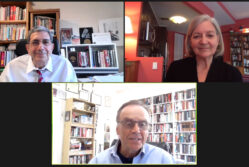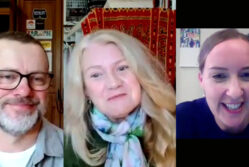Event Coverage Highlight

Authors Discuss Press Suppression in Russia’s Past and Present
by Chad Bouchard
Russian and Soviet history is fraught with the use of censorship, misinformation and restrictions on press freedom to shape a favorable narrative for citizens and observers abroad. On Feb. 29, the OPC hosted a discussion with authors whose books detail tools of Russian repression in two eras nearly a century apart.
Alan Philps, a former Moscow correspondent for Reuters and the Daily Telegraph, wrote The Red Hotel: Moscow 1941, the Metropol Hotel, and the Untold Story of Stalin’s Propaganda War.
He said in the early days of World War II, European correspondents jockeyed for limited spots in Moscow as German occupation expanded and and Russia limited access to only about two dozen foreign correspondents.
Allied reporters had to operate under tight control, sequestered in the iconic Metropol Hotel, barred from traveling outside without a Soviet minder or mingling mingle with Soviet citizens in Moscow. Communication was monitored and all reports had to pass censors, who would often completely rewrite their copy.
“It was a strange time. Complete fraternization was allowed in the Metropol between the foreigners and the Soviet citizens, which wasn’t allowed anywhere else in Stalin’s time. That was to keep the journalists quiet, since they weren’t really allowed to do their job.”
“It was made clear that [the correspondents] were going to be made part of the Kremlin propaganda output whether they liked it or not,” he said.
Philps said his investigation into the Metropol Hotel’s World War II era started with two key sources. He met a former Russian translator, Tanya Matthews, who was born in Grozny with the name Tanya Svetlova, while she was working as a correspondent for the BBC in Tunisia. She fled Russia in 1944 with her husband Ronnie and son Christopher but shared many recollections about life in the hotel during her wartime years in Moscow.
Philips found another source in the memoirs of Nadia Ulanovskaya, who was born in Ukraine and fought with the Bolsheviks during the revolution. She became a Soviet intelligence officer and operated in China, New York, Berlin, Paris and then later returned to Moscow where she mingled with hotel guests. Her daughter taped her remembrances before she died in 1986.
Philips said he also gleaned information from national archives for the U.K.’s domestic security agency, MI5, which tracked British journalists closely. He also spoke with descendants of other figures who lived at the Metropol.
Paul Starobin, former Moscow bureau chief of Businessweek and a frequent reporter on Russia, is the author of Putin’s Exiles: Their Fight for a Better Russia.
Starobin said he started focusing on Russian exiles after the 2022 invasion of Ukraine and ensuing crackdown on media, which caused about one million people to flee the country.
“It seemed to me very interesting that a kind of age-old Russian pattern was repeating itself – of exile – which has always been the flipside of repression,” he said. “You can go back to the 19th century or even earlier, and there have always been these exiles, many of whom have been politically charged and organized, with an agenda for change inside of Russia, but brought about from outside of Russia.”
Starobin traveled to Georgia and Armenia to conduct his field research. He also interviewed Russian exiles remotely in Munich, Paris, London, Washington, D.C. and Cyprus.
Starobin outlined several different types of exiles in the book, including followers of the recently murdered opposition leader Alexei Navalny, dissident priests, former military and some journalists. He said exiles working in media formed a global “information resistance” network, with operations such as TV Rain, or Dozhd, an independent television station for Russian news that is now based in the Netherlands.
“Their mission was to undertake news, commentary and investigations and deliver that in the Russian language back into the Russian homeland, where platforms like YouTube and Telegram were still open.”
Starobin said he is not sure why Russia hasn’t blocked YouTube, but many Russian exiles are preparing for that possibility.
“YouTube is used by so many ordinary Russians, for their kids to watch cartoons, or parents at night watching movies, and the political part of it is just one small fraction,” he said. “I think the authorities are still calibrating just how much do they want to crack down. You can get people restive and unhappy if you start denying them simple things like being able to access YouTube.”
He added that many Russian exiles have high-tech skills, with an estimated 10 percent of the pre-war IT workforce in exile, so Russian authorities are probably aware they would be able to find ways around media bans.
The Red Hotel is available for purchase here:
Putin’s Exiles is available for purchase here.
Click the window below to watch a playlist of video clips from the program.



